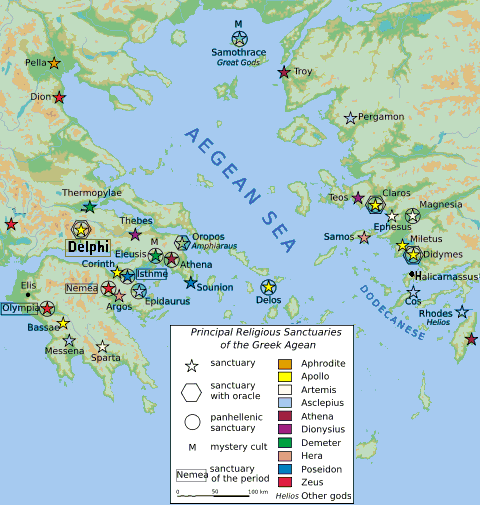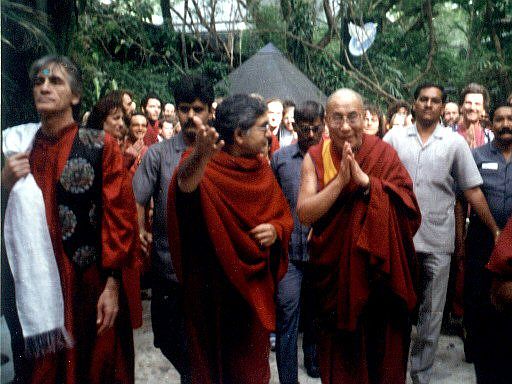Plants, the Oracle of Delphi and the Dalai Lama
Beloved Osho,
While traveling in Greece with a group of sannyasins, we visited
Delphi, the place of the ancient Oracle, and where it is said
Pythagoras once lived. We all felt a peaceful happiness while
walking around the ruins, and in the end we all gathered on the top
of the stadium and sat silently with each other. What happened to
us? Why does one have such different feelings about different
places?

People like Pythagoras, Socrates, Plotinus, Gautam Buddha, Lao
Tzu, Chuang Tzu... the people of such state are continuously
radiating - not with any effort, but effortlessly and
spontaneously. Their experience, just like a candle, radiates light;
their consciousness has become a light. Their being has attained to
a fragrance, to a flowering, and everything around them is going to
catch it. For centuries it will continue to vibrate.
I have not been to Delphi. I was thinking to go, but before being at
Delphi I was arrested and thrown out of Greece. But Delphi was one
of the places I would have liked to visit.
In India I have visited a few places... The place where Gautam
Buddha became enlightened is called Bodh Gaya. It is a small temple
- some follower made the temple as a memorial, by the side of the
tree under which Buddha became enlightened. That tree still
remembers something, and I came to know later on that the bodhi tree
has a certain substance which no other tree has, and that is the
substance which makes a man a genius. Only geniuses have that
substance in their mind, and in the world of trees only the bodhi
tree has that substance. Perhaps it is more perceptive, more
receptive; it has a certain genius.
Buddha remained under that tree for many years. The whole area is
still fragrant, and just by the side of the tree is the place where
he used to walk. When he used to get tired of sitting and meditating
then he would walk and meditate, so that place is marked by marble
stones. But sitting under the tree or walking on those marble
stones, you can feel you are not in this world, that this place has
something which no other place has. Perhaps the moment Buddha became
enlightened something exploded in him and was caught by everything
that could catch it. We used to think before... but it is not the
case. Now it is well proved that trees are very sensitive, more
sensitive than man - their sensitivity just has a different level.
One scientist was working on trees. He had put on the tree a certain
mechanism, just like a cardiogram, that takes the graph of the
feelings of the tree, and he was surprised that when the gardener
came... He had told the gardener, "You go and cut one of the
branches of the tree. I want to see the effect." But there was no
need to cut the branch. As the gardener came with his axe, the graph
was already going mad!
The scientist said, "Don′t do that - the tree has already caught
the idea that you are going to cut and hurt her." Later on he became
more amazed, because when you cut one tree, all the other trees in
the surrounding area, their graphs go mad. When the same gardener
comes to water the tree, the graph remains perfectly balanced - it
becomes even more harmonious. It seems the tree is able to catch
your thoughts, your ideas. (read in this regard
Plants Respond).
Perhaps the same may be found about rocks, the earth, because they
are all alive. Their life may be on a different level, but they are
all alive - and certainly they are more simple and more innocent.
People have been keeping... In Tibet they have been keeping the
bodies of enlightened people, because if the trees and the stones
and the earth are impressed by the great experience, then certainly
the body of the man, his bones, must be impressed - they are
closer.
Perhaps Tibetans were the first to understand it: they have covered
ninety-nine great masters′ bodies with gold. That used to be the
most sacred place in Tibet. It is just... If you have seen the
picture of Potala, the palace of the Dalai Lama, it is just
underneath it. Potala is high in the mountains, and underneath there
are many caves. One cave is devoted only to those ninety-nine
bodies.

Why did they stop at ninety-nine? A strange figure! A hundred would
have been more appropriate. They had to stop because the lineage of
Dalai Lamas dropped from the height it used to be, and the country
could not produce anybody worthy of taking the hundredth seat in the
sacred, secret temple. It was opened once a year for the people, and
just to pass through it was to pass through another world.
Now it is completely closed so that the communists cannot find it -
because they will not be interested in the bodies; they will be
interested in the gold. They will destroy those bodies and take the
gold - and it is a great quantity of gold. So before the Dalai Lama
left Lhasa because of the communist invasion of the country, he
sealed it in every possible way so that they cannot discover it. And
they have not been able yet to discover it.
Slowly, slowly in all the countries where spirituality has flowered,
people became aware that something happens... So people have
preserved things that were used by these people, or just have made
memorials of their bodies. In India bodies are burned, but you will
be surprised to know that the remains left after burning a body are
called "flowers". Ordinary people′s ashes are thrown into holy
rivers, but enlightened people′s "flowers" are preserved in samadhis
- in beautiful marble memorials. Just to go and sit there is in
itself a meditation. But the trouble is that the world is ruled by
those who know nothing of this.
For example, Delphi should not be open for everybody, because they
will destroy its subtle vibration. But the government is interested
in tourism!
Delphi should be open only to a few people who are chosen - chosen
by a mystery school that should exist there. Delphi was a mystery
school. In the days of Pythagoras and Socrates, Delphi was the
temple - the most famous temple - of wisdom. And the priestess
used to go into a trance. While praying and dancing and singing in
the temple, she would go into a trance, and in her trance she would
say things which always proved to be true. She herself could not
remember anything when she came back from the trance; perhaps the
trance was taking her higher into the mind, perhaps to the cosmic
mind.
In such a trance she declared that Socrates was the wisest man in
the world. And a few people visiting her from Athens were very
happy, because Socrates was an Athenian. They reached Socrates - he
was old - before his death, before his murder, and said, "You
should be happy; the oracle of Delphi has declared you the wisest
man in the world."
Socrates said, "It is too late. When I was very young I used to
think that I was very knowledgeable, very wise. The more I came to
know, the more I became ignorant - aware that what I know is
nothing, and what I do not know is so much. Now, in my old age, I
can say without any hesitation that I do not know anything. The
oracle, for the first time it seems, has missed."
The people were very much surprised, because Socrates should have
been happy hearing it. They went back and the priestess again
danced, fell into a trance. They asked her in the trance, "You said
Socrates is the wisest man in the world, but he denies it. He says,
′I do not know anything...′"
And the priestess in her trance said, "That′s why he is the wisest
man in the world. Only idiots say that they know. Those who are wise
cannot say that."
Places like these, or Bodh Gaya, should not be available to tourists
- which is an ugly race with all their cameras, binoculars, and
stupid things. And they are not interested in the place at all; they
are taking photographs and rushing from here to there. Later on,
sitting at home, they will look at the photographs and say, "Great!
Our tour has been great. We visited beautiful places - you can
see."
But they were never there; they were with their cameras. They should
sit there, they should allow themselves to absorb the subtle vibe of
the place... Something of Gautam Buddha must be there; it has to be
there!